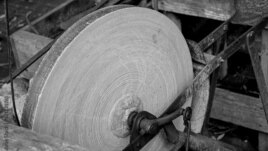28 September, 2024
And now, Words and Their Stories, from VOA Learning English.
Learning a language is difficult. Sometimes it requires a plan and resources. But it also usually requires hard work. People who persist with their language goals often get good results. They keep working even through hard times. They keep their nose to the grindstone.
When you keep your nose to the grindstone, you work very hard for a long time at something. You don't give up.

FILE - This is an antique grindstone used for sharpening knives. (Adobe Photo by Mannyo/Wirestock Creators)
How do we use this idiom in daily life? How did it come to mean perseverance? And just what is a grindstone? We answer all these questions on today's show.
First, let's talk about a grindstone. A grindstone is a large stone circular stone with a hole in the middle. An axle fits through that hole. When the stone turns quickly on the axle, it can sharpen, shape, or smooth a tool.
And that brings us to the beginnings of this idiom.
On his website Phrase Finder, writer and language researcher Gary Martin suggests two possible beginnings. Both are set in work environments of long ago: a place for milling grain and a place for sharpening tools.
Some online sources claim that keeping your nose to the grindstone comes from milling grain. If the stone got too hot while grinding, it could burn the grain. So, workers would have to keep their noses close to the stone and smell for any sign of burning.
However, word expert Martin says that doesn't seem true. He claims that these mills used millstones. So, if this story were true, we would say keep your nose to the millstone. But we don't.
He also notes that the terms “millstone” and “grindstone” were used interchangeably hundreds of years ago. But then, at some point long ago, that stopped. Grain mills used millstones and not grindstones. And vice versa – tool sharpening workshops used grindstones and not millstones.
So, let's talk about the explanation set in a tool sharpening workshop. Martin talks about old workshops in his area of England. He says these workshops have benches very near to grinding stones. Workers would sit on the benches hunched over and work very hard and very long. He goes on to write the following:
“They had to pay close attention to their work as a moment too long on the wheel could cause the steel to overheat and be ruined.”
Martin guesses that this story is the more likely explanation. Imagine being hunched over your work and working hard at it. That describes having your nose to the grindstone.
In some cases, we also say put your nose to the grindstone. We may say it this way if we give someone advice. For example, “You need to put your nose to the grindstone if you're going to finish this project on time.”
Now let's hear another example.
A: Have you seen Marisa lately? She hasn't called or texted in weeks!
B: I was worried about her too. But the other day, I ran into her co-worker. She said Marisa has her nose to the grindstone trying to finish her year-end report.
A: Oh I forgot about that! In that case, let's take her some dinner. She never eats when she's busy with work.
B: Good idea! I'll make my famous pasta and meatballs.
If I had to pick an opposite of this idiom, it would be this one: All work and no play makes Jack a dull boy.
Life can't be all about work. So, if you've been keeping your nose to the grindstone, remember to take a break.
And that's all the time we have this Words and Their Stories.
Until next time, I'm Anna Matteo.
Anna Matteo wrote this lesson for VOA Learning English.
_____________________________________________
Words in This Story
persist – v. to continue to do something in spite of opposition, warnings, or pleas
idiom – n. an expression that cannot be understood from the meanings of its separate words but must be learned as a whole
perseverance – n. continued effort to do or achieve something despite difficulties, failure, or opposition
axle – n. a pin, pole, or bar on or with which a wheel revolves
mill – v. Milling transforms grain into flour for food preparation. : – n. A mill is where grain is processed into flour.
vice versa – adv. with the order changed : with the relations reversed
bench – n. a long seat for two or more persons
hunch over phrasal verb to bend one's body into an arch or hump
opposite – adj. as different as possible
dull – adj. mentally slow